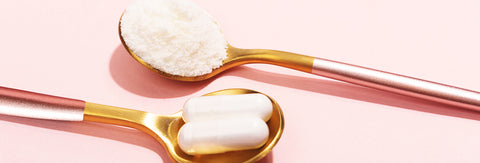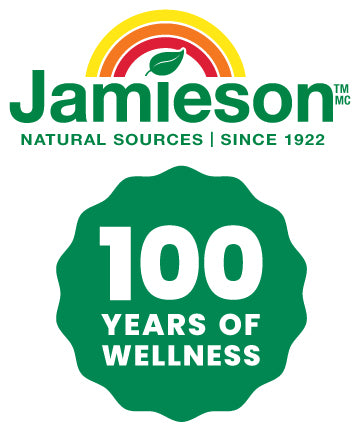Canada is known for its harsh winters, but that doesn’t stop Canadians from getting outside. There are many health benefits to being outside more often; unfortunately skin health is not one of them. Instead, the winter’s cold winds can dry out your skin. We may not have any control over Mother Nature, but we do have control over what we put in our bodies. Our skin is our largest organ and is affected by not only the external environment but also the nutrients we ingest. If you want to ensure your skin is at its healthiest level, with the added bonus of reducing wrinkles, collagen is the nutrient you are looking for!
Did you know that our skin is made up of 3 major layers?
The outside layer, called the epidermis, works to protect you from the environment. The innermost fatty layer is called the subcutis and works to conserve your body's heat as well as protecting your vital inner organs. The middle layer, called the dermis, contains all the nerves that allow our sense of touch and to feel pain and temperature. It is also where wrinkles can occur![1]
The dermis is made up of two main proteins, collagen and elastin, which work to offer support and elasticity in the skin. 70-80% of the protein in the dermis is made up of collagen which is required to keep wrinkles at bay.¹ However, as we age our bodies begin to make less collagen, leading to a physical look of aging. In fact, according to the research journal Dermato-Endocrinology, overall collagen content “of the skin surface is known to decline approximately 1% per year”.[2]
What is collagen?
Collagen is the most abundant protein found in mammals, making up 30% of our total protein mass.[3]
What does collagen do?
Collagen plays structural roles and contributes to mechanical properties, organization, and shape of our tissues. There are 28 different types of collagen, of which some are only found in certain tissues and provide specific biological functions. Others are found together. For example:
- Collagen type I and V are found in the cornea of the eye.
- Collagen type II and III are found in cartilage, the tough tissue that cushions our joints.
- Collagen type I and III are found in our skin.³
Growing up, we heard "you are what you eat"; now you may hear the quote "Beauty Starts from Within"; and this is actually true. When we provide our bodies with the nutrients needed, our skin looks healthier. Collagen type I & III are important nutrients required to keep our skin healthy and smooth. This is why it is important to verify the type of collagen used when looking at collagen supplements.
Different types of collagen provide different health benefits.
Although collagen type II can help to reduce joint pain associated with osteoarthritis,[4] it would not be effective for improving your skin. With so many companies touting “beauty” claims on packaging, you want to ensure there is research to back up those claims. Below is information on 3 separate research papers showing the benefits of a specific collagen made up of type I & III called VERISOL®; this is the collagen used in Jamieson Anti-Wrinkle.
Research on Collagen for Anti-Wrinkles
In a double-blind, placebo-controlled study, researchers assessed the effectiveness of a specific bioactive collagen peptide (BCP) called VERISOL® for skin wrinkles.
- 114 women aged 45-65 years were randomized to receive 2.5 g of VERISOL® (the same amount and type of collagen used in Jamieson Anti-Wrinkle). Skin wrinkles were objectively measured before starting the treatment, after 4 and 8 weeks, as well as again 4 weeks after they stopped taking VERISOL®. Researchers found a statistically significant reduction of eye wrinkle volume compared to the placebo group after 4 and 8 weeks of intake. However, what was more surprising was that the positive long-lasting effect was observed 4 weeks after they completed the last dosage and were no longer taking VERISOL®.[5]
Research on Collagen for Cellulite
In a double-blind, placebo-controlled clinical study, researchers investigated the use of VERISOL® for cellulite.
- 105 women aged 24–50 years with moderate cellulite were randomized to orally receive a daily dosage of 2.5 g VERISOL® or a placebo over 6 months. The degree of cellulite was evaluated before starting the treatment and after 3 and 6 months of intake. It was “concluded that a long-term therapy with orally administered BCP leads to an improvement of cellulite and has a positive impact on skin health”.[6]
Research on Collagen for Nail Growth
In an open‐label, single‐center trial researchers studied the use of VERISOL® for nail growth and brittle nails.
- 25 participants took 2.5 g of VERISOL® once daily for 24 weeks followed by a 4‐week off‐therapy period. Nail growth rate and the frequency of cracked and/or chipped nails were assessed by a doctor during treatment and 4 weeks after discontinuation. Results showed a 12% nail growth rate increase and a 42% decrease in the frequency of broken nails. Additionally, 88% of participants still experienced an improvement 4 weeks after treatment stopped. Overall, the study demonstrated that the daily ingestion of VERISOL® “increased nail growth and improved brittle nails in conjunction with a notable decrease in the frequency of broken nails.” [7]
The research on VERISOL® collagen provides proof that beauty really can come from within. When it is available in either caplets or a delicious strawberry liquid, it is also easy to add into your daily beauty routine.
Sources
[1] WebMD. An Overview of the Skin. Accessed Sept 15, 2019 at: https://www.webmd.com/beauty/cosmetic-procedures-overview-skin#1
[2] Ganceviciene R. et al. (2012). Skin anti-aging strategies. Dermato-Endocrinology. Jul 1; 4(3): 308-319.
[3] Ricard-Blum S. (2011). The Collagen Family. Cold Spring Harb Perspect Biol;3:a004978
[4] Health Canada. Hydrolyzed Collagen. Accessed Sept 13, 2019 at: http://webprod.hc-sc.gc.ca/nhpid-bdipsn/atReq.do?atid=hydrolized.collagen&lang=eng
[5] Proksch E. et al. (2014). Oral intake of specific bioactive collagen peptides reduces skin wrinkles and increase dermal matrix synthesis. Skin Pharmacol Physiol. 27(3):113-9.
[6] Schunck M. et al. (2015). Dietary Supplementation with Specific Collagen Peptides Has a Body Mass-Index Dependent Beneficial Effect on Cellulite Morphology. J Med Food. Dec 1;18(12):1340-1348.
[7] Hexsel D. et al. (2017). Oral supplementation with specific bioactive collagen peptides improves nail growth and reduces symptoms of brittle nails. J Cosmet Dermatol. Dec;16(4):520-526.




